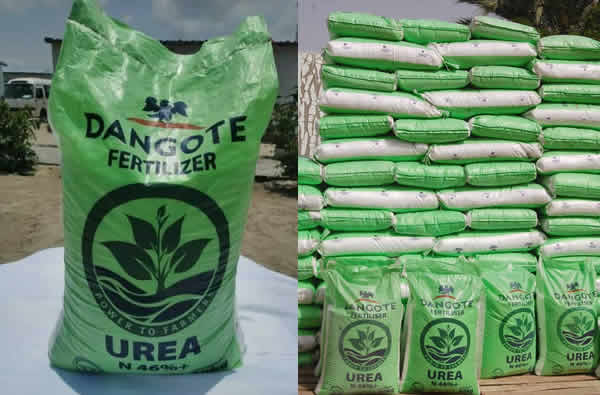Price of a Bag of Fertilizer in Nigeria

The planting season is upon us, farmers are gathering their tools and prepping their soil to plant the different food crops consumed in Nigeria. Every farmer’s dream is for their crop to yield abundantly and one of the ways to ensure this is by incorporating manure into the soil. The prices of fertilizers are not what they used to be, they have become expensive and have caused many people to become curious about the current price of a bag of fertilizers in Nigeria.
This article provides information on the price of a bag of fertilizer in Nigeria and other information relevant to the subject matter. See details below.
Fertilizers
In simple terms, fertilizers are substances added to soil or plants to enhance their growth and development. They provide essential nutrients that may be lacking in the soil, promoting healthier plant growth and higher yields. These nutrients are nitrogen, phosphorus, and potassium.
Types of Fertilizers
In Nigeria, the primary types of fertilizers commonly used are urea and phosphate compound fertilizers. Additionally, there are NPK compound fertilizers and blend fertilizers available, such as triple 15-15-15, 20-10-10, and 10-20-10, among others.
Urea Fertilizer
Urea fertilizer is known for providing a big boost of nitrogen. Nitrogen is an important element for chlorophyll production. Urea fertilizer promotes lush green growth in leaves and stems. Urea is a great source of nitrogen for plants but lacks other essential plant nutrients like phosphorus and potassium.
How Urea works: Urea breaks down quickly in the soil, making nitrogen readily available to plants.
Phosphate Compound Fertilizers
Phosphate compound fertilizers, unlike urea which focuses on nitrogen supply phosphorus to plants. Phosphorus is vital for healthy root development, allowing plants to efficiently take up water and nutrients from the soil. It is also a key component of ATP (adenosine triphosphate), the molecule that stores and transfers energy within plants. Adequate phosphorus ensures plants have the energy needed for essential processes like growth, flowering, and fruit production.
Phosphate compound fertilizers often contain different forms of phosphorus, with some offering immediate availability and others providing sustained release over time. This ensures a consistent supply of phosphorus throughout the growing season. Many phosphate compound fertilizers combine phosphorus with other essential nutrients like nitrogen and potassium (NPK fertilizers). This provides a more balanced plant nutrition.

Price of a Bag of Fertilizer in Nigeria
The cost of fertilizers in Nigeria depends on the type, blend, and size. Below is a breakdown of the price of a bag of fertilizer in Nigeria.
| Type | Weight | Price |
|---|---|---|
| Urea | 50kg | ₦48,000.00 |
| NPK 15:15:15 | 50kg | ₦60,000.00 |
| NPK 20:10:10 | 50kg | ₦55,000.00 |
| NPK 20:20:20 | 50kg | ₦50,000.00 |
| Calcium Nitrate Fertilizer + Boron |
50kg | ₦62,000.00 |
What Factors Influence The Cost of Fertilizers in Nigeria?
How To Properly Apply Fertilizers to Your Crops
There are several methods for applying fertilizer to the soil, the most common methods are the broadcasting/Top Dressing method and Side dressing.
- Broadcasting Method: This method involves spreading the fertilizers uniformly all over the field.
- Drilling: This method involves applying the fertilizer while planting. The seed and the fertilizer are applied at the same time but at different depths in the soil.
The Best Place To Buy Fertilizers in Nigeria
The best place to buy fertilizers in Nigeria depends on factors such as your location, budget, and specific fertilizer needs. Below are your options:-
- Agricultural Supply Stores: Many towns and cities in Nigeria have agricultural supply stores that specialize in selling fertilizers, seeds, and other farming supplies. These stores carry a variety of fertilizers, you can visit anyone closest to you and buy your fertilizers.
- Cooperative Societies: Farmers’ cooperative societies often have arrangements for bulk purchasing of fertilizers at discounted rates. Joining a cooperative can provide access to affordable fertilizers and other agricultural inputs.
- Government Agencies: In Nigeria, government agencies such as the Federal Ministry of Agriculture and Rural Development or state agricultural development programs distribute subsidized fertilizers to farmers through special programs or initiatives.
- Online Platforms: There are online platforms and e-commerce websites in Nigeria that specialize in agricultural products, including fertilizers. You can browse through a wide range of fertilizer options, compare prices, and place orders online for convenient delivery.
- Local Markets: In rural areas, local markets or agro-markets have vendors selling fertilizers alongside other agricultural products. While the selection may be limited, local markets can be a convenient option for small-scale farmers.
- Farm Supply Cooperatives: Some farm supply cooperatives or agricultural associations operate their own stores or distribution networks for members to purchase fertilizers and other inputs at competitive prices.
Frequently Asked Questions
Which NPK is best for plants?
The best NPK suitable for plants is the NPK 15:15:15
How much is a 50kg bag of fertilizer in Nigeria?
The price of a bag of fertilizer in Nigeria depending on the type ranges from about N50,000 to N60,000.
What is the price of a 50 kg Bag of Urea fertilizer?
A 50kg bag of Urea fertilizer costs about ₦48,000.00 in Nigeria.
